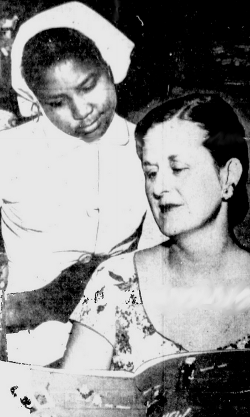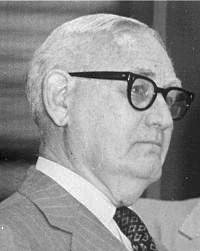I’ve been re-reading Ammon Hennacy’s autobiography in preparation for something I hope to write about the “one man revolution” theory as he and Thoreau sketched it out. Along the way, I noted the mention of a handful of war tax resisters from that first generation of the modern American war tax resistance movement (roughly ) whom I haven’t otherwise had opportunity to mention at The Picket Line:
- Dorothy DaPonte
- “About this time [] I had a letter from a teacher in Fairhope, Ala. where I had taught in 1924. Her name was Miss DaPonte and she had refused to pay taxes. She told of some boys, Quakers whose parents I had taught when I was there, who had refused to register. The judge in Mobile told the boys: ‘Well, you pay your taxes, don’t you? And a large amount of our taxes goes for war purposes. If you were consistent in carrying out this belief, you would also refuse to pay your taxes.’ ”
- “I had the address of Dorothy DaPonte, a tax refuser in Mobile. She had moved but when we drove into Fairhope across the bay where I had taught history in the high school 26 years before we found that Miss DaPonte was a teacher there. She came of an old southern family and nearly caused her father to have a nervous breakdown last year when she refused to pay taxes and had bravely escorted a young Negro girl to the front seat with her in a Methodist Church. By now her father was getting used to her, only deploring that there were no others in the community who also refused to pay taxes. Two teachers at the school planned to fast with us [during , when some nuclear disarmament activists were fasting at the White House] although they had to stay there and teach. Miss DaPonte would have liked to have come along but had to stay as a witness in some trial about segregation. As many do who are new in a movement she asked why I did not fast-to-the-death on the White House steps against the H-Bomb.…”
- Margaret Dungan
- Among the fasters in : “Margaret Dungan was an elderly, smiling lady who taught in a high-class girls school. She is also a tax refuser with whom I had corresponded. She was a good sport in picketing and stood up in fasting much better than the super-vegetarians whom I expect watched their loss of weight too morosely.”
- “Miss Dungan felt that if a person led a life of voluntary poverty he would miss the aesthetic values: music, beauty, etc.…”
- Kenneth Patton
- “One Sunday morning [in I think], waiting at the Fairgrounds [somewhere in Arizona] for a bus I was talking to a man who was the brother of a Universalist preacher by the name of Kenneth Patton, who had refused to pay taxes for war but had had the tax taken from his bank account. I gave this man extra copies of the CW to send to his brother.”
- Ned Richards
- [Also , in Philadelphia] “I also spoke to the War Resisters League and met Ned Richards and family, COs and tax refusers from away back.”
- George Yamada
- [] “George Yamada, Japanese CO who did time in Civilian Public Service and in Danbury Penitentiary visited me for a week. Aside from Scott Nearing, and my friend Max Heinegg of New Zealand, George is the only vegetarian I have met who is a good worker. Likely this is because he is Japanese and not because he is a vegetarian. George cleaned ditches ten hours a day that week. He kidded and said it was not such hard work for him because he did not have far to stoop as he was built close to the ground. ¶ George had a print shop on the Coast but gave it up rather than pay income taxes for war. He is an expert linotype operator, but will not take the excellent pay this occupation gives, for a withholding tax for war is taken. He has been visiting the Hopi and helping them plant corn. Never a harsh word of Hopi parents to their children he reports. He feels that the Hopi represent a way of life that is an oasis in the world of gadgets. He did not mind my wood stove, oil lamp, and lack of an icebox or air conditioning, for the Hopi cannot afford these things either.”
- [] “The night before we were to make the signs George Yamada came over and we discussed the content of the signs.”
- [] “I needed a little rest so we took half an hour off and drove to the ranch where George Yamada was working and told him of the events of the week. Each time I fasted and picketed because of Hiroshima I had sent my leaflets and an air mail to the Mayor of Hiroshima. This year George mailed the letter for me with his own greeting in Japanese.”
- “My Hopi friends brought along a copy of CRISIS which had an article on the Hopi by our mutual friend George Yamada. Here the land question is discussed…”
Many other war tax resisters from that era also get mentions, for example: Ernest & Marion Bromley, Horace Champney, Lloyd Danzeisen, Dorothy Day, Ralph DiGia, Saunders Dixon, Richard Fichter, Walter Gormly, Art Harvey, George Houser, Emily & Walter Longstreth, Bradford Lyttle, Milton Mayer, Karl Meyer, A.J. Muste, Juanita & Wally Nelson, James Otsuka, James Peck, Eroseanna Robinson, Max Sandin, Ralph Templin, and George Willoughby.
I give excerpts from the book for the above five only because they have otherwise been as yet unsung here.


